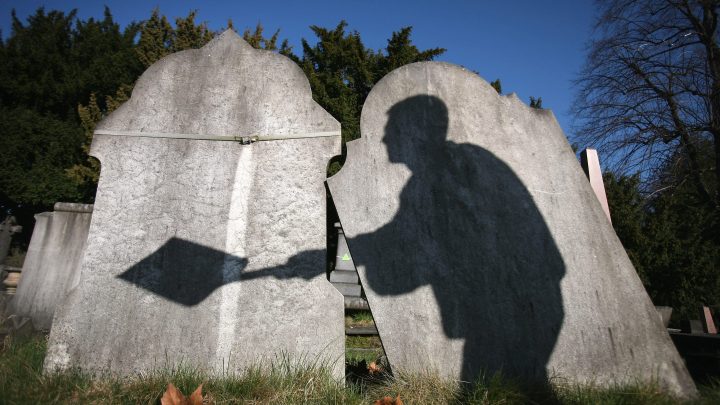
There’s a corner of the internet where YouTubers read strangers’ obituaries. Why?
There’s a corner of the internet where YouTubers read strangers’ obituaries. Why?

The question of what happens to someone’s social media or their digital footprint after they pass away is something we’re still grappling with.
But what happens when you gain a posthumous digital presence from your obituary getting uploaded online?
Kate Knibbs is a senior writer at WIRED and she’s been covering the strange world of YouTube obituary pirates. She joined Marketplace’s Kai Ryssdal to talk about the strange phenomenon. Below is an edited transcript of their conversation.
Kai Ryssdal: First of all, we have to establish some some phraseology here. YouTube obituary pirates. What are they?
Kate Knibbs: YouTube obituary pirates are a bit of a mystery to me to this day. They are people who upload videos of themselves summarizing the obituaries of strangers. They just turn on their cell phone camera, explain someone else’s obituary and then upload it. And as far as I can tell, it’s a money making scheme, although I don’t know how much money they’re making off of it.
Ryssdal: So you answered my next question, right? They’re doing this to make money I imagine?
Knibbs: It certainly seems that way. I’ve tried to contact them but I haven’t successfully had conversations. But several of the more popular YouTube obituary pages were ad supported. So I was watching pre-roll from like Etsy and Harry and David and a few other companies before I could get the obituary video. So yeah, they’re successful enough that they’re able to generate at least some revenue off of advertising.
Ryssdal: Okay, got it. Now, how did you come to this story?
Knibbs: A friend of mine texted me and asked me if I’ve ever heard of YouTubers who make a living by reciting obituaries. And he had come to the story in a very sad way; an old childhood friend of his had passed away and he found at least 10 of these videos of random, mainly men just reciting facts about her. And he was so unsettled by it that he wanted to learn more, and I did what I could to get some answers for him.
Ryssdal: So this is obviously deeply hurtful and troubling to friends and relatives of those who have passed. And it’s shady and creepy and all those kinds of things. But I wonder if it says something about the incentives we have on the internet in this society, right? That’s kind of what this is about?
Knibbs: Absolutely. I do think that the people who are making these videos are acting callously towards the bereaved. It’s quite a tasteless pursuit. But it seems as though it’s a pursuit driven by desperation, like they are casting around looking for ways to make money online. And it’s because these platforms prioritize traffic above good taste that it results in strange cottage industries like this.
Ryssdal: Are obituary pirates a new thing, though, and technology is just sort of exacerbating it? Or have these been around for a while?
Knibbs: The YouTube element of it is fairly new. That’s cropped up in the last few years. But obituary pirating has actually been around since obituaries went online. There is this whole other cottage industry where people looking to make a quick buck would basically plagiarize legitimate obituaries that were posted online by local newspapers or on legacy.com. They’d create their own, like, obituary repositories online and try to divert the web traffic. And some of the companies that have been doing this have actually seen some repercussions because it was straight plagiarism. But the YouTubers get around any legal repercussions because they’re summarizing the obituaries. Even though it’s a really messed up thing to do, it’s technically probably legal. They could likely successfully use the fair use doctrine to protect themselves from any legal liabilities.
Ryssdal: What did YouTube have to say?
Knibbs: They didn’t have that much to say about it. I think they didn’t end up commenting. I also reached out to some of the companies whose advertisements I had seen, and none of them wanted to comment on the record either. It seems like something everyone involved would prefer to not exist, right?
Ryssdal: You watched, I imagine, a bunch of these in reporting this story. What’s your takeaway?
Knibbs: Yeah, I don’t know. The whole thing is really twisted. And it’s definitely made me think about how, when I die, there’s almost certainly going to be like 10 to 15 strangers across the world emotionlessly reciting the facts of my death.
Ryssdal: Oh, well, of course, it’ll be a while, and AI will get involved somehow, and then there’s going to be that whole dynamic.
Knibbs: Oh, I mean, I’m actually surprised I didn’t find AI-generated obituary pirating going on already. I feel a little worried that I’m speaking it into existence right now because it seems like a natural extension of the scam to remove the already minimal human effort that’s involved.
There’s a lot happening in the world. Through it all, Marketplace is here for you.
You rely on Marketplace to break down the world’s events and tell you how it affects you in a fact-based, approachable way. We rely on your financial support to keep making that possible.
Your donation today powers the independent journalism that you rely on. For just $5/month, you can help sustain Marketplace so we can keep reporting on the things that matter to you.

















